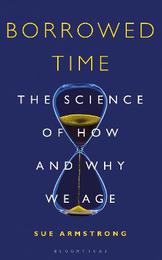
|
Borrowed Time: The Science of How and Why We Age
Paperback / softback
Main Details
| Title |
Borrowed Time: The Science of How and Why We Age
|
| Authors and Contributors |
By (author) Sue Armstrong
|
| Physical Properties |
| Format:Paperback / softback | | Pages:272 | | Dimensions(mm): Height 198,Width 129 |
|
| Category/Genre | Popular science
Life sciences - general issues |
|---|
| ISBN/Barcode |
9781472936080
|
| Classifications | Dewey:612.67 |
|---|
| Audience | |
|---|
|
Publishing Details |
| Publisher |
Bloomsbury Publishing PLC
|
| Imprint |
Bloomsbury Sigma
|
| NZ Release Date |
1 December 2020 |
| Publication Country |
United Kingdom
|
Description
Like 'time', everyone knows what ageing is until we try to pin it down. When does it begin? How does it happen and why? What lies ahead for each of us individuals, and would we want to live forever, given the option? The question of how and why organisms age has teased scientists for centuries, yet there is still no agreement. There are a myriad of competing theories, from the idea that ageing is a simple wear and tear process, like the rusting of a car, to the belief that ageing and death are genetically programmed and controlled. In fact, there is no clearly defined limit to life, and no single, predictable programme playing itself out: different things are happening within and between tissues, and each system or organ accumulates damage at its own pace, according to the kind of insults imposed on it by daily living. Sometime before 2020, the number of people over sixty-five worldwide will, for the first time, be greater than the number of 0-4 year olds; and by 2050 there are likely to be 2.5 times as many older people in the world as toddlers. With statistics like these, society is understandably preoccupied with the 'greying of the world', and there is a huge community of scientists exploring the phenomenon from every angle. Sue Armstrong tells the story of society's quest to understand ageing through the eyes of the scientists themselves, as well as through the 'ordinary' people who exemplify the mysteries of ageing - from those who suffer from the premature ageing condition, Hutchinson-Gilford syndrome, to people still running marathons in their 80s. Borrowed Time will investigate such mind-boggling experiments as transfusing young blood into old rodents, and research into transplanting the first human head, amongst many others. It will explore where science is taking us and what issues are being raised from a psychological, philosophical and ethical perspective, through interviews with, and profiles of, key scientists in the field and the people who represent interesting and important aspects of ageing.
Author Biography
Sue Armstrong is a science writer and broadcaster based in Edinburgh. She has worked for a variety of media organisations, including New Scientist, and since the 1980s has undertaken regular assignments for the World Health Organization (WHO) and UNAIDS, writing about women's health issues and the AIDS pandemic, among many other topics, and reporting from the frontline in countries as diverse as Haiti, Papua New Guinea, Uganda, Thailand, Namibia and Serbia. Sue has been involved, as presenter, writer and researcher, in several major documentaries for BBC Radio 4; programmes have focused on the biology of ageing, and of drug addiction, alcoholism, obesity, AIDS, CJD, cancer and stress. Her previous book was p53: The Gene that Cracked the Cancer Code, also published with Bloomsbury Sigma. It has been highly commended by the BMA Book Award.
ReviewsEngrossing questions throng science writer Sue Armstrong's round-up of research on the biology of ageing. A rich, timely study for the era of 'global ageing'. * Nature * A fine introduction to the research and controversies about how we age. * Times Literary Supplement * Armstrong, a British science and health writer, presents, in crack Michael Lewis style, the high points of aging research along with capsule biographies of the main players. * The New Yorker * Complex, nuanced and cautious, yet it suggests we are on the brink of a revolution. * The Sunday Times * Ms Armstrong doesn't pretend that there is any one answer to the question of why we age as we do. The science she presents is a grab bag of divergent theories, each championed by a scientific subspeciality. * Wall Street Journal * As a seventy-five-year-old man I felt oddly rejuvenated by this book. Try it yourself! -- Professor Steve Jones Sue Armstrong's book humanely tackles ageing in a way that is grounded, philosophical and makes the most complex science accessible to lay people like me. While not dangling false hopes of innovatory medical cures, it is full of hope about the strides being made in gerontology and pharmacology. And while I may be getting older, the vigour of this book is life-enhancing. -- Claire Fox, Director of the Academy of Ideas and panellist on BBC Radio 4's The Moral Maze Authoritative, comprehensible and fun to read. The book ageing research has been waiting for. -- Richard Faragher, Professor of Biogerontology at the University of Brighton Borrowed Time gives a wonderful overview of the fast-evolving science of longevity. I thoroughly recommend this book as a primer on what will become a key industry in the next two decades or so. * Jim Mellon, Chairman, Juvenescence Ltd. *
|